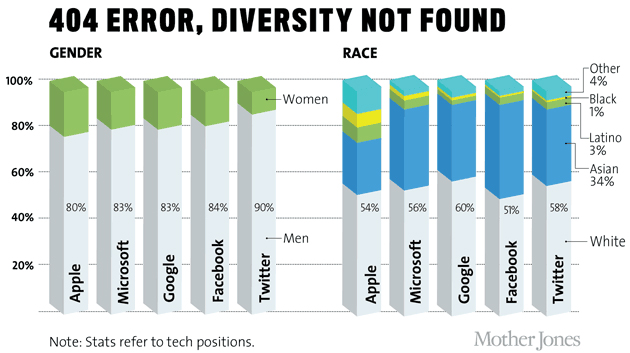~
On July 14, Facebook released its latest “diversity report,” claiming that it has “shown progress” in hiring a more diverse staff. Roughly 90% of its US employees are white or Asian; 83% of those in technical positions at the company are men. (That’s about a 1% improvement from last year’s stats.) Black people still make up just 2% of the workforce at Facebook, and 1% of the technical staff. Those are the same percentages as 2015, when Facebook boasted that it had hired 7 Black people. “Progress.”
In this year’s report, Facebook blamed the public education system its inability to hire more people of color. I mean, whose fault could it be?! Surely not Facebook’s! To address its diversity problems, Facebook said it would give $15 million to Code.org in order to expand CS education, news that was dutifully reported by the ed-tech press without any skepticism about Facebook’s claims about its hiring practices or about the availability of diverse tech talent.
The “pipeline” problem, writes Dare Obasanjo, is a “big lie.” “The reality is that tech companies shape the ethnic make up of their employees based on what schools & cities they choose to hire from and where they locate engineering offices.” There is diverse technical talent, ready to be hired; the tech sector, blinded by white, male privilege, does not recognize it, does not see it. See the hashtag #FBNoExcuses which features more smart POC in tech than work at Facebook and Twitter combined, I bet.
Facebook’s decision to “blame schools” is pretty familiar schtick by now, I suppose, but it’s still fairly noteworthy coming from a company whose founder and CEO is increasingly active in ed-tech investing. More broadly, Silicon Valley continues to try to shape the future of education – mostly by defining that future as an “engineering” or “platform” problem and then selling schools and parents and students a product in return. As the tech industry utterly fails to address diversity within its own ranks, what can we expect from its vision for ed-tech?!
My fear: ed-tech will ignore inequalities. Ed-tech will expand inequalities. Ed-tech will, as Edsurge demonstrated this week, simply co-opt the words of people of color in order to continue to sell its products to schools. (José Vilson has more to say about this particular appropriation in this week’s #educolor newsletter.)
And/or: ed-tech will, as I argued this week in the keynote I delivered at the Digital Pedagogy Institute in PEI, confuse consumption with “innovation.” “Gotta catch ’em all” may be the perfect slogan for consumer capitalism; but it’s hardly a mantra I’m comfortable chanting to push for education transformation. You cannot buy your way to progress.
All of the “Pokémon GO will revolutionize education” claims have made me incredibly angry, even though it’s a claim that’s made about every single new product that ed-tech’s early adopters find exciting (and clickbait-worthy). I realize there are many folks who seem to find a great deal of enjoyment in the mobile game. Hoorah. But there are some significant issues with the game’s security, privacy, its Terms of Service, its business model, and its crowd-sourced data model – a data model that reflects the demographics of those who played an early version of the game and one that means that there are far fewer “pokestops” in Black neighborhoods. All this matters for Pokémon GO; all this matters for ed-tech.

Pokémon GO is just the latest example of digital redlining, re-inscribing racist material policies and practices into new, digital spaces. So when ed-tech leaders suggest that we shouldn’t criticize Pokémon GO, I despair. I really do. Who is served by being silent!? Who is served by enforced enthusiasm? How does ed-tech, which has its own problems with diversity, serve to re-inscribe racist policies and practices because its loudest proponents have little interest in examining their own privileges, unless, as José points out, it gets them clicks?
Audrey Watters is a writer who focuses on education technology – the relationship between politics, pedagogy, business, culture, and ed-tech. She has worked in the education field for over 15 years: teaching, researching, organizing, and project-managing. Although she was two chapters into her dissertation (on a topic completely unrelated to ed-tech), she decided to abandon academia, and she now happily fulfills the one job recommended to her by a junior high aptitude test: freelance writer. Her stories have appeared on NPR/KQED’s education technology blog MindShift, in the data section of O’Reilly Radar, on Inside Higher Ed, in The School Library Journal, in The Atlantic, on ReadWriteWeb, and Edutopia. She is the author of the recent book The Monsters of Education Technology (Smashwords, 2014) and working on a book called Teaching Machines. She maintains the widely-read Hack Education blog, and writes frequently for The b2 Review Digital Studies magazine on digital technology and education.

Leave a Reply